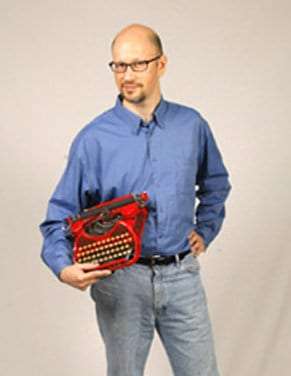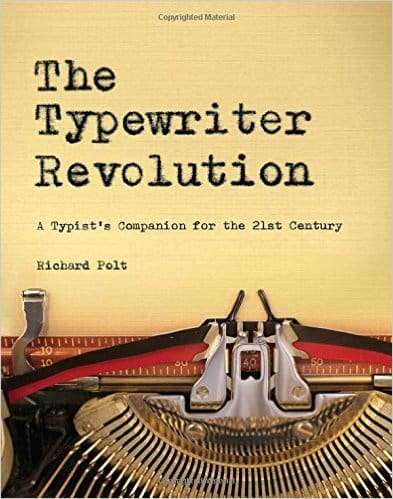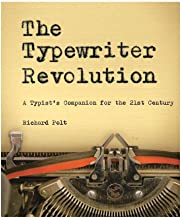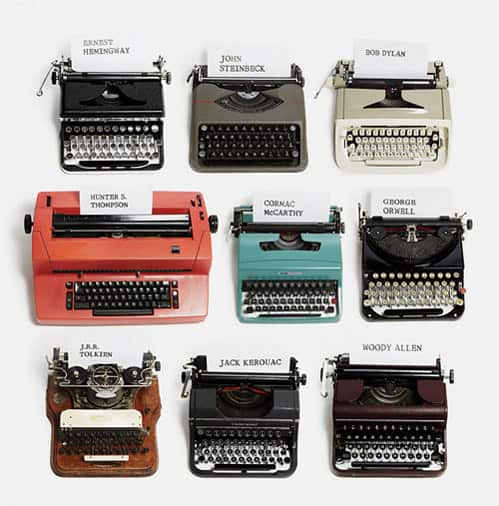The Typewriter Revolution: A Typist’s Companion for the 21st Century by Richard Polt

Richard Polt
I’m typing these words on a computer, and you’re reading them from one. The ideas begin in my head, flow down my arms into the keyboard, and then they’re digitized and blasted through the great,
endless expanse of the Internet. Your computer snags them and turns them into letters on a screen, which pour through your eyes and re-form as ideas in your brains.
At no point, though, are the ideas or the words that represented them rendered in anything physical. You can’t touch them or hold them, and if I don’t like the way they come out, I can’t snatch them up, crumple them into a ball, and toss them into the wastebasket.
In the days of yore, I would be crafting this article on a typewriter, generating the clackity-clack sound that indicated some serious writing was going on. Maybe I’d be doing it in the solitude of my home. Or maybe it would be taking place in an office, where the click-click-dinging of an orchestra of typewriters created a symphony of creativity, productivity and resourcefulness.
 Since the arrival of the word processor and the personal computer, most typewriters have been consigned to closets, storage rooms or basements. Today, though, “the typewriter has crawled back from its near-death experience, thanks to people who use and love this machine,” types Richard Polt, author of The Typewriter Revolution: A Typist’s Companion for the 21st Century (The Countryman Press; November 12, 2015). Polt is one of countless enthusiasts who are bringing about a typewriter renaissance.
Since the arrival of the word processor and the personal computer, most typewriters have been consigned to closets, storage rooms or basements. Today, though, “the typewriter has crawled back from its near-death experience, thanks to people who use and love this machine,” types Richard Polt, author of The Typewriter Revolution: A Typist’s Companion for the 21st Century (The Countryman Press; November 12, 2015). Polt is one of countless enthusiasts who are bringing about a typewriter renaissance.
Today’s typing rebels “come from all ages and groups; they speak different languages and practice many professions,” Polt writes. “But something ties them together: the love of typewriters and the will to swim against the tide.”
One of those swimmers is actor, producer and writer Tom Hanks, who wrote in a New York Times essay that he is “well versed in the focus-stealing racket one can make with a vintage manual typewriter.
“The tactile pleasure of typing old school is incomparable to what you get from a de rigueur laptop,” according to Hanks. “Everything you type on a typewriter sounds grand, the words forming in mini-explosions of SHOOK SHOOK SHOOK. A thank-you note resonates with the same heft as a literary masterpiece.” (On a laptop, Hanks argues, the opening line of Moby Dick simply sounds like “callmesihmael.” The same line on a 1950s Olympia typewriter becomes “CALL! ME! ISHMAEL!”)
Both Hanks and Polt admit that computers are far more efficient than typewriters. But Polt writes that efficiency may not be all that it’s cracked up to be. “All our efficient devices have freed up a lot of time—supposedly,” he writes. “But we use up that free time doing more of the same . . . We process so efficiently that we don’t dwell upon thoughts and words anymore—we flit incoherently from one set of distractions to the next.” Need proof? Take away the cell phones from a group of people, and see how long they last before they go into Candy Crush withdrawal.
“It’s not efficient to cook a meal from scratch,” writes Polt. “It’s not efficient to ride a bike down a country path. It’s not efficient to learn an instrument instead of downloading a song, or to sketch a landscape instead of pointing your smartphone at it.”
“[But] sometimes we don’t want life to be seamless,” Polt writes. “We want to feel resistance, we want to take our time, we want to savor the experience . . . For the typewriter revolution, writing is one of those intrinsically valuable experiences.”
The typewriter revolution—and the human urge to do something just for its own sake, and not for efficiency—guarantees that even in the digital age, we’ll live in “a world where the devices help, enable and invite, but aren’t mistaken for our equals or our masters,” Polt writes. “A world where each of us feels free to set any device aside and take up his or her own favorite tools—or no tools at all.”
Buy this Book!
Amazon





